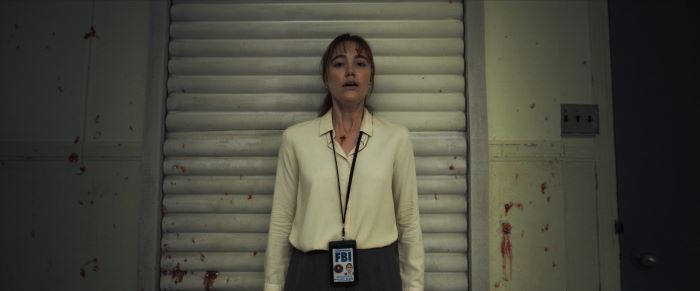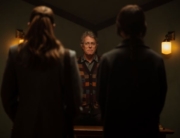Good horror movies aspire to become the stuff of your nightmares. However, it’s rare for them to succeed in producing a unique experience for audiences eager to be scared or to brag about not being scared (or not that much). After several solid attempts, Osgood Perkins has finally achieved this with Longlegs. Significant trivia: His father was Anthony Perkins, an actor immortalized by his role as Norman Bates in Alfred Hitchcock’s Psycho (1960). Osgood can now rest easy, having finally created a work worthy of rivaling the terror his father left us with.
Longlegs also centers on a serial killer, or more precisely, a series of violent crimes following a strange pattern, suggesting there might be an organizing principle behind them. On the 14th day of any given month (in different years), a family tragedy occurs in which a father kills his family before himself as if possessed by a fit of madness. Each time, a little girl is celebrating her birthday on that day, and receives a sinister gift. Notes written in an invented language are left behind, signed with the name that gives the movie its title. So, the FBI is on the search to identify the Longlegs behind these letters, while also anticipating the possibility of similar crimes occurring again.
President Clinton’s portrait hangs in FBI offices, which places us in the 1990s, as rookie FBI agent Lee Harker (Maika Monroe) is assigned to accompany Agent Carter (Blair Underwood) in solving this case; she is seen as some sort of psychic for perceiving or discovering clues others haven’t worked out. She doesn’t disappoint as she not only figures out how to decipher the symbols in Longlegs’ notes, but also identifies an algorithm right before the next killings are set to occur. However, there may be more personal reasons connecting her to this case. Lee also has a birthday on the 14th, and as a child, she had a terrifying encounter with a horrifying figure—this flashback introduces the movie and gives us the first substantial jump scare.
Longlegs is the kind of movie that benefits from not revealing too many details beforehand: Osgood builds with calm and confidence suspense that viewers must experience for themselves (and then discuss with others who have seen it). The music and sound design are carefully crafted to increase stress as the movie’s initial realistic tone gradually gives way to infernal delirium. Admirably, there’s less violence here than you’ll likely remember, just one of many familiar elements that will lead to inevitable comparisons with Seven (1995) and especially The Silence of the Lambs (1991). Yet it has enough originality to evoke these films rather than emulate them.
It’s no secret that Nicolas Cage participates in this movie, and given his stature, should you expect anyone else playing the titular role? (Wink, wink, assume at your own peril.) So, it’s impossible not to praise his presence and the disciplined narrative economy in which he is used as a secret weapon, one that could ruin the movie if overexposed. Cage has never before created a monster this unforgettable. He’s a bit of Nosferatu, Hannibal Lecter, and Buffalo Bill, and at the same time out of a hagsploitation worthy of Baby Jane. You won’t forget him. Meanwhile, Monroe solidifies her position as a scream queen, becoming the necessary vulnerable and human anchor that makes the nightmare tolerable.
Perkins has crafted a disturbing film, and what could secure it a place in the canon of effective horror movies is the mastery with which it sustains the sense of endless dread. It’s a cinematic nightmare that weakens rational thinking to terrify us with the conviction that evil exists as a supernatural force that should not be underestimated or ridiculed. This infernal work simply pushes viewers headfirst into an irrational world devoid of hope, where evil is the only thing that can prosper. That’s how you produce an endurable chill.







Leave A Comment